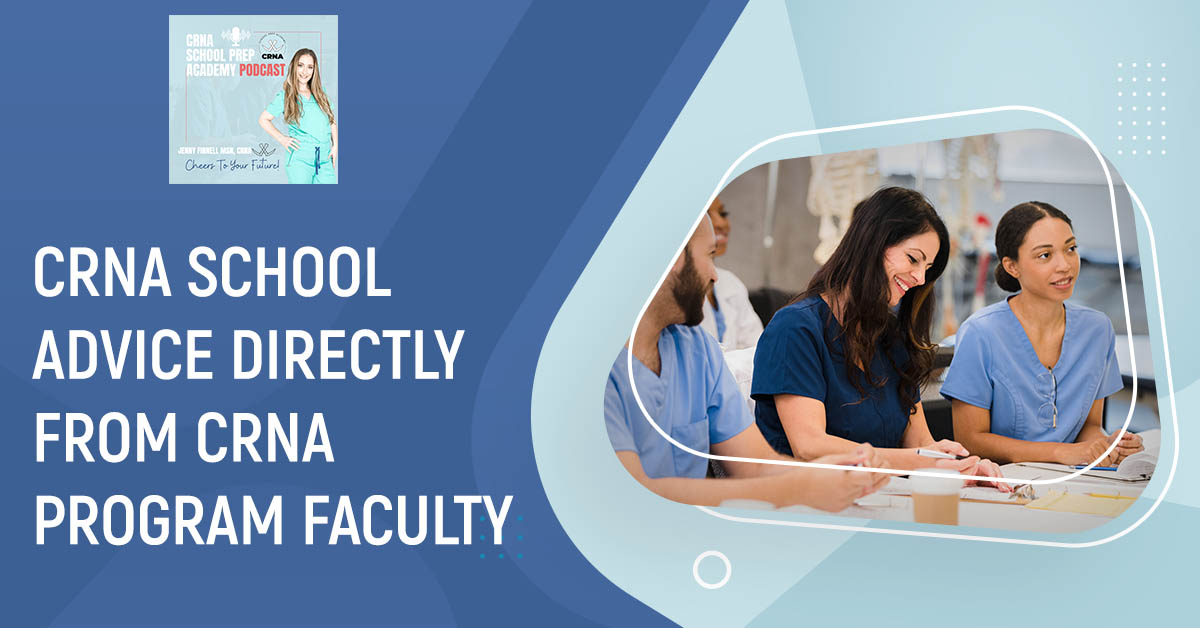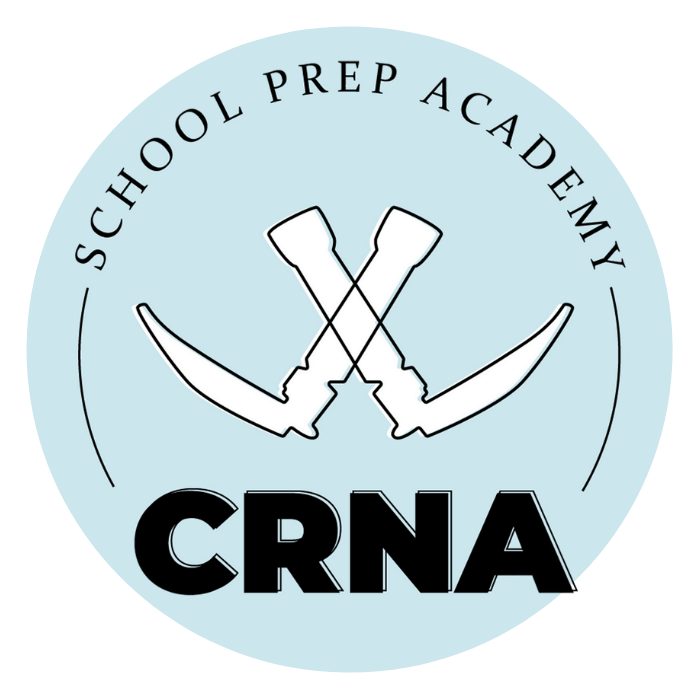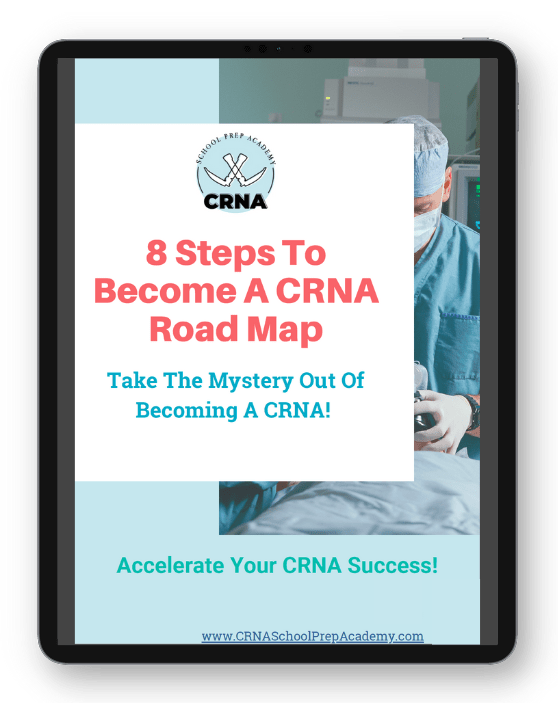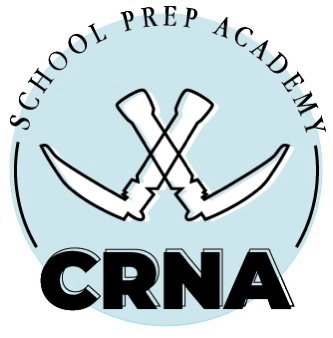
Who better to give you CRNA school advice than CRNA program faculty members? In this episode, Jenny Finnell chats with Richard Wilson, MNA, CRNA about the newest offering coming from CRNA School Prep Academy: Nurse Anesthesia Educators Unplugged, a podcast for CSPA students featuring current program faculty members from across the country.
Designed to support you no matter where you are on your journey to CRNA, with straight-from-the-source information regarding program admission requirements, the true rigors of school, what really matters when looking to be a stand-out applicant and so much more. Tune in to learn more about what this show is going to offer, how to tune in and a few sneak peeks into what you’ll learn while listening!
Get access to planning tools, mock interviews, valuable CRNA Faculty guidance, and mapped-out courses that have been proven to accelerate your CRNA success! Become a member of CRNA School Prep Academy here!
https://www.crnaschoolprepacademy.com/join
Book a mock interview, personal statement critique, resume review and more at https://www.TeachRN.com
Join the CSPA email list here! https://www.cspaedu.com/podcast-email
Send Jenny an email or make a podcast request!
Hello@CRNASchoolPrepAcademy.com
—
Watch the episode here
Listen to the podcast here
CRNA School Advice Directly From CRNA Program Faculty
Before we dive into our episode about CRNA school advice– Some exciting news is that we launched Nurses Teach Nurses, now called TeachRN! This is a custom-built platform that’s going to allow you to get the services you’re looking for such as mock interviews, resume edits, and personal statement edits. We now have the ability to expand how many service providers we have, as well as how many services we can offer.
This is completely separate from CRNA School Prep Academy which is going to give you more possibilities. In fact, you can even become a service provider. You can apply right there on the platform to be a service provider. If you want to give back to an ICU nurse who’s looking to ramp up their resumes for an ICU position, you can do that. I hope you check out TeachRN. Head over to TeachRN.com to explore the possibilities.
—
We have a very special guest, Richard Wilson. Welcome to the show.
I’m glad to be here. Thanks for having me on.
We have some exciting things to share with you. What I want you to start thinking about is how cool it would be to get guidance directly from program faculty from all across the country. I know that sounds like a dream come true, but that’s exactly what we are getting ready to embark upon. I wanted to bring Richard on the show to discuss a private faculty podcast that’s only for your ears, meaning our CSPA students, how we are going to start sharing this with you, and what it’s going to be about. For those of you who are not familiar with Dr. Richard Wilson, he recently graduated with his DNP. Congratulations.
Thank you.
For those of you who have been part of the academy, I’m sure you are familiar with Richard. For those of you who are not, he has been involved with CRNA School Prep Academy from almost the beginning. About six months into launching CSPA, Richard contacted me. He’s like, “Hi, Jenny. I keep seeing you pop up on people who are coming to our open house and people are putting you on their resumes. What is this all about? Who are you?” From there, our relationship formed. Since then, he’s become a friend and a colleague. He’s an astonishing CRNA and leader within the community.
He also has a very strong background education. He’s been in education for over thirteen years as assistant program director. He is also very heavily involved within the educational community and is one of the moderators for a faculty Facebook group. He’s very in-the-know with all the high points as far as what are programs looking for, what’s on their radar as far as the incoming cohorts, and how can they help these students to be more successful. He is very well-versed in education and the demand and needs of the students. I’m so excited to have you on the show and go into this new podcast. Welcome.
Thank you. I’m excited about the new podcast. I’m also glad to get it kicked off. You and I had discussed this a year or so ago, looking at the ideas of how we can benefit the community and what we can do to get them in touch with advising and getting mentorship directly from the source. It is great that we are able to move forward with this in 2023. I have spoken with a lot of faculty members over the years that are very interested in this and glad to be a part of it. The mentorship for faculty members is a key reason why we get into it. I’m very excited about this.
If I had any dream back when I first started CSPA, this was it. I want it so badly. I didn’t know how at the time, but one of my pain points was I feel like these students need guidance directly from the program faculty. Like you spoke to, you need to hear it coming from the horse’s mouth. I know I have said that before, but the reality is that all these schools are slightly different. I realized that when I started mentoring. I’m like, “This is not one code to crack. This is a bunch of codes to crack.”
These schools are all looking for very unique attributes. They all can be a little different, but yet similar. What I see, I’m viewing up from looking down and zooming in. People get tunnel vision when they are applying to one school. They don’t realize that there’s a big umbrella that encompasses applying to CRNA schools.
This is an opportunity to hear a variety of opinions about what it takes to be a strong applicant and how to get through school successfully. We are going to get into more of what are some topics we are going to cover in this special episode. If you are a CSPA student, this is going to be a podcast you are going to have access to. This is going to be a private podcast. I want to be very clear about that.
We will on occasion share some juicy episodes with everyone who listens to the regular show. Don’t worry. We are not going to leave you completely in the dark, but this is going to be a special private show for CSPA students. We are going to try to aim for four episodes a month, so a once-a-week release. Richard, I would love to get into more as far as what are some of the topics that you plan on covering on this podcast.
As you were talking about the mentorship part of it, I am briefly getting into that and where our vision is leading into some of the episodes that we are going to look at coming forward. There are a lot of people or a lot of CRNAs who have the idea of mentorship, who want to give back to the community, and who want to mentor those that want to come in.
They are going from their personal experiences of when they got into CRNA school or what it was like through CRNA school. That’s a very narrow view of it. They mean well and they do give some great advice. However, it is a very small picture. As we look at it over the nation, there are 125 programs across the nation and we are expanding.
Nurse Anesthesia Educators: Unplugged
From what I’m hearing, we are about to be at 130 programs in the coming years. That’s awesome for the expansion. That’s also for our students within CSPA. That means there are going to be more opportunities. What we are looking at is we are trying to give them a broad view. We are trying to give them a bigger picture of instead of university X, Y, Z, let’s look at how can we make you a better applicant for all 125 if we want to.
The mission, vision and values are different for each one of those. Those are some things that we are going to try to uncover there. In University X, what are their mission, vision and values? In University Y, what are theirs? It’s going to gear you towards that. If you are interested in this university, what are the things you need to be looking at? What are some of the hot topics that they have within their program? We all differ within each one of our assets.
This council on accreditation for Nurse Anesthesia Education programs and COA puts out standards that every program must meet. No questions asked. You’ve got to have critical care experience. You have to have a Bachelor’s in Nursing or an Associate Degree in Nursing with a Bachelor’s in a science-related field. They have got these overarching categories that you have to fit in, but then each program gets to narrow it down to what they see as a fit for their program. That’s going to be one of the things that we want to make sure we hit. How do you fit into each one of their programs? Do those programs even fit you, in general?

We are going to look at everything from admission standards. We are going to look at how you become a better applicant when you are answering these personal statement questions. What are they looking for? What’s going to pop for them? What’s going to be interesting for them? When we talk about organizing your resumes, what’s going to be a better way for them to look at your resume and view it so that you can be seen as successful, and they get the high points of that?
Even getting into interview tactics and what kind of interviews. What’s going to be key is we are going to ask these programs to share something special about them. That’s one thing we want people within CSPA, our students, to be able to know. What is special about each and every program? Instead of looking at all programs and not being able to figure it out, because you can’t decipher it from their Facebook page, their Instagram site or their website. You are going to hear it straight from one of the faculty members. I have already hit on this and it’s awesome to see. I’ve got program directors, assistant program directors, and clinical coordinators. We’ve got all kinds of faculty members interested in coming to this show already.
I’m so excited about that. It’s wonderful to see the community step up and be excited to do this. That was always my dream. I was like, “I don’t know if it was ever going to work”, but I knew in some way and in some fashion, I want to involve the community. We all collectively as a whole have so much that we can share and give back, but it takes us all.
The value is the fact that we are all a little unique. We are all a little different. All these programs are a little unique and different. They have different leadership, faculty, backgrounds, and experiences. All of that brings a lot to the table and as far as you’re picking what school is best for you, and what school or what student is best for the program from their end. There are some little nuances as I would call them about certain programs. I would love to hit on that on this show. For example, some schools only require your ICU experience within the last 2 to 3 years.
What does that mean? Do they technically give preference to those students who are active in the ICU? For students, they read a requirement or a recommendation, and it’s up for their own interpretation as far as what that looks like on the faculty side of things when they are doing the interviews and looking at all the applicants.
It’d be interesting to dive into some of those more controversial topics and break them down and allow these students to understand from a faculty point of view what this recommendation truly means to them. What are some maybe caveats around that, that maybe the students should take more seriously?
The great thing is I have been a faculty member for thirteen years. I have learned the lingo over those years. I have learned the nuances that you are talking about and how each program has different nuances as we dove into our own admission standards for our program and see how we compare to others. That’s going to be a fun part of this. It is diving into those nuances that you talk about and deciphering what that lingo means. When they say current ICU experience, what does that mean and where does that put you in these minds?
We have a lot of candidates throughout the programs across the nation going to the faculty forum that I help moderate, going into the meetings for the assembly of didactic and clinical educators, which are educators from all across the nation and from CRNA programs. Speaking with them, they all speak different languages. When we can put it all together and we can see, “What do our candidates need to do to be successful?”
A lot of candidates have an idea, and I don’t mean this with any disrespect towards the candidates because they are working hard, they are doing their best, and they have got a goal of getting into the CRNA school. They are looking at it and saying, “Here’s what I need to do to get in.” They are looking at a piece of paper or they are looking at a website. They are looking at the recommendations that are put out there. We are going to get it straight from the faculty’s mouth. We are going to get it straight from them to say, “This is what it says but this is what you need to do.”
In other words, when it says current ICU experience, a lot of people think, “Maybe current means as long as I have been in it within the last two years, I will be okay.” You are then going to hear from faculty members who say, “No. That’s listed and that’s a generality, but you are competing against 75 other people who are currently in the ICU, and this is where it makes you stand.” We are going to get that opinion on many different topics, and not only on admission standards, we are going to talk about what it’s like to be in CRNA school.
We are going to have a few faculty members that come on and say, “Here’s what it’s like to be in CRNA school. Here’s what the real deal is.” We are going to talk about what the academic standards are. What are the clinical training standards? How do you professionally get through a program? How do you prepare for that national certification exam at the end and how do their programs do it? We are going to hopefully break all of this down. Not only are you going to get good information on how to be successful getting into school and getting through school, but in a manner of this, you are also going to be able to compare schools and see which is a great fit for you.
This is going to be so exciting. I’m excited to also dive more into what it’s like being in school. I hear all the time from a lot of our students who go on to get in, which is exciting. They get blindsided by this fear and anxiety where they are like, “This is real. This is happening. What is this going to be like?” There are a lot of unknowns. You are walking into a dark room and you don’t know what’s going to happen when they turn on the lights.
We can shed some light on what it’s like to be in school, and what the expectations are for you as a student, academically, clinically and professionally. This is something I wish I would have had in school that I didn’t. It is how to make your time in school valuable more than just academically or clinically but as a professional growth aspect. I have now seen in my career, which took me over six years to go into after graduation, that this community is amazing.
The CRNA Community
The more you can engulf yourself and what it means to be a CRNA and not just the actual practice, the more rewarding and more satisfaction you are going to get out of your long-term career. The connections and friendships you will develop are lifelong friendships. I would love to see students understand what that’s like. As a student, I know you are busy, but there are little tiny things that are not time-consuming that you can do to plug into the community.
In 2006, I graduated from Nurse Anesthesia Program. I went straight into a level-one trauma center working, and then within about three years or so, I got into the academic realm. I was fortunate enough to be thrust into a professional environment within a couple of years after anesthesia school. However, if I had not, then I would have missed out on a lot of that aspect you are talking about. Back then, the professional aspect was not pushed quite as much as it is now. Now those connections and that environment of being able to get to know people using those connections, whether it’s for a job, advice, anesthetic techniques, or whatever it may be. Those are bigger now than they have ever been.
I had a student when I was working and he is from Ohio, but he thinks he wants to go back to Texas to work. I was like, “You’ve got to go to conferences. This is the best way to get word of mouth and find jobs.” He was expressing how he wasn’t sure where he wanted to work. He didn’t know how to navigate that. It’s connecting with people through going to OSANAs and state or spring meetings for example that’s coming up. Students are going to go sit in a boring classroom and listen to people preach to them some more, but the reality is that’s not the way.
If you’ve never been to a state association meeting or any national association meeting, that’s not what it’s like. It’s connecting with people that you were like, “I didn’t know you were going to be here.” I know a CRNA in Alaska and I’m from Ohio. These events draw people from all over the country. Sometimes they are people that you may know from other areas that you may be surprised by or even in CRNA school. Maybe you’ll meet a coworker from Arizona that you haven’t worked with since you were an ICU nurse, and you didn’t realize they were even in CRNA school, but here they are. It’s a cool way to see how small of a world this is, and how you can form relationships that will serve you throughout your career.
I laugh at that also because I don’t know if this group is old enough to know this thing, The Six Degrees of Kevin Bacon. When we look at CRNA programs or we look at CRNAs in particular, we always say they are only about 2 to 3 degrees away from everybody because somebody always knows somebody. There are 63,000 nurses across the nation. There are 125 programs across the nation. There’s a large population of nurses, but it’s such a small group that somebody knows somebody everywhere, which is huge.
The candidates are only about two to three degrees away from everybody because somebody always knows somebody. Click To TweetIt’s amazing to watch CRNAs, especially when they have students or potential students come to meetings. They are so excited to introduce them to everybody there. Whether it is CRNAs that they have practiced with for years or whether it’s leaders within the communities and association. It’s always, “Let me help you. Let me reach out.” That’s what part of this show or a large part of this show is going to be. It is letting us help you reach out to those individuals, and being able to make those contacts.
Once you have seen one of the directors, you’ll feel more comfortable than possibly reaching out to them and talking with them, and asking them questions once you see what they are about or who they are. It’s going to be making those contacts within this show also. It’s going to be big. Something you mentioned was about diving into programs and what it’s like to be successful. You said it. We are not going to focus just on academics and clinical. We are going to focus on how can you professionally and personally be successful. What’s going to set you up for that once you do get into a CRNA program?
We see a lot of individuals who have imposter syndrome. We see that all the time on Facebook forums. Whether it’s within CSPA or others that I’m involved with. Jeff Ray at the University of Southern California is the Program Director out there, one of the greatest guys you’ll ever meet. That is his focus and we are going to have him on here talking about imposter syndrome. We are not just going to hit on what does a GRE mean and what does a 3.5 in your core science courses mean? All of that. We are going to hit on every topic we can to not only make you successful getting into school but also once you get into a program.
Mental Wellness In CRNA School
Another conversation I had too with a student was about how important it is, and I preach this a lot; it’s one of those topics that people don’t realize is a big deal until it becomes a problem. It is your mental wellness and where you stand with that prior to entering school, and then throughout your entire program. It is so key that you don’t neglect that area of your own wellness because that can play a pivotal part in your success. You can be a straight-A student and still struggle in CRNA school. People sometimes go to CRNA school with the false impression, “I have always been good academically, I will be fine.”
Please don’t take this as Debbie Downer, but I just want to mentally prepare you. The fact that just because you have a tracker, it doesn’t mean that what you are getting ready to go into is going to be what you’ve experienced before. It’s probably more than likely going to be different. It’s a different level of stress that you are getting ready to be put under. It’s something you’ve never experienced before.
It’s best to address where you stand mentally going into your program prior to letting it smack you in the face, and then trying to figure it out. Part of this show is going to be these faculty who have seen good solid students come in and struggle and say, “This is how they can help themselves prior to starting the program so they don’t experience this amount of pressure and stress.”
I also think a lot of us are perfectionists. We are used to being top of our game. We are used to being at the top. When we don’t feel like we are achieving, we take that incredibly personally. We don’t know how to handle it because we are not used to failing. We are used to being very successful. Having a good mindset around the growth mindset, which we preach a lot, is vital to being a handle when occasionally maybe you could have a bad test or maybe you have a bad day in clinical or something of that nature.
It’s like you said. We are taking high-performing individuals. They have been at the top of their game. They are highly regarded and respected within their units, and they are coming into a program to learn more about what they are doing and to learn more about anesthesia or to expand their knowledge base and expand their practice.
I always look at it this way. Some people say, “It wasn’t this difficult of a transition going from high school to nursing school or anything like that.” You have to understand, when you were going from high school to nursing school, you were learning possibly a whole different lingo, a whole different knowledge base of information, where you look at the healthcare field. When you go from the ICU to anesthesia, you are learning more about what you are already doing, and then adding the anesthesia aspect to it.

When we talk about arterial lines, neuromuscular blocking agents or anything like that, you thought you had a good understanding of it in the ICU and you did for your level of experience, but now we are expanding on that to a whole different level, and then you start questioning yourself of, “Did I even know anything?”
That’s where some of that imposter syndrome obviously comes into when we talk about it, but that’s why we want to touch on those aspects, and get it from people that can tell you, “No. You are going to go through some of these struggles.” We are going to give you the real facts of the struggles you are going to go through. How do you get through that? How do you even prepare for that before you even get there so that you are successful when it does happen because it’s going to happen?
This show is going to be able to support you. It’s going to be able to support you whether you are still figuring out whether you are going to apply to CRNA school. Maybe you are in CSPA to dig into the planning tools. Maybe you are already actively working on your application or maybe you’ve already gained acceptance.
This show is going to have topics on here that are going to support you all the way through your journey. I love the fact that we are bringing in the community to do that. People are lining up at our door to come on this show. They are so excited about it because they want to share and help you. The one thing I have noticed too, now that I have gotten to know a lot of program faculty, is their heart and their passion are for you, the student.
They would not ever be in education if they truly didn’t have the heart of a mentor. They all do. They all want to see you succeed. Being a faculty is hard work. To be honest with you, now that I have seen both, it’s easier to be a CRNA at work. To be a faculty and a CRNA, you’ve put a whole other level of stress on yourself. The fact that these faculty are doing this willingly, it’s because they truly care about your success. That’s what this show is. It’s because our community cares about you and we genuinely want to see you succeed with grace and ease.
Being A Successful Candidate For CRNA School
We are going to call it Nurse Anesthesia Educators Unplugged. The goal is to get down to the core with the nurse anesthesia educators on what makes a successful candidate. We have said this within CSPA a number of times. Our theory is if we can get stronger candidates, then we are going to have stronger students who become stronger CRNAs. The goal with any faculty members is that we want to have the strongest student possible to come in. If we can help with preparing that before they even get into a program as they are going through the application process, that’s what we want to do.
Nurse Anesthesia Educators Unplugged's goal is to get to the core with the nurse anesthesia educators of what makes a successful candidate. Click To TweetI’m excited about the show. It’s going to be a great mentorship opportunity. I’m excited about all the people, even from new program directors to those that have been out for a number of years. Those that have been CRNA for a number of years and also have been program faculty for maybe 10 to 15 years are still excited and want to jump on this so that they can be a part of the mentorship that’s going on with CSPA.
A strong student is not just a GPA. You have to be well-rounded. You are going to be enlightened when you tune in to this show and realize there are so many different aspects these programs consider and want for you and your own success. I’m excited to share this show with you. Thank you, Richard. People are probably wondering, when is the launch date? Now we have hyped this all up. When can they get their ears on this show?
Our goal is to start filming immediately and get these on board. I already have several that have agreed to be on the first episode. Therefore, our goal is going to be an early February 2023 launch date with the podcast Nurse Anesthesia Educators Unplugged. Keep your eyes open. We will post it within CSPA. I’m excited about that launch date.
Me too. You’ll be getting an email. You’ll be notified. Also, the format to explain like, “How am I supposed to listen to this? Is it going to be on Apple, iTunes or those types of things?” It’s not. It’s going to be inside CRNA School Prep Academy. It’s going to be its own separate course where you’d go in and view if we have video. We may or may not have videos for all the episodes, but we are going to have audio for sure.
You’d go into your regular academy membership and you would watch or listen to these podcasts there. One thing that we are going to be doing is I want to share some episodes with our listeners of CRNA School Prep Academy. On occasion, we will be sharing some of these episodes on the regular CRNA School Prep Academy show. We’re not going to leave you completely in the dark. I want to help you too, but I wanted to make sure that this was very special for CRNA School Prep Academy students. I’m so excited. Thank you, Richard, so much for coming on the show and explaining to everyone this new exciting offer that we have coming in 2023.
Thank you. I’m excited about it and good luck, everybody.
Important Links
- Richard Wilson – LinkedIn
Get access to planning tools, valuable CRNA Faculty guidance & mapped out courses that have been proven to accelerate your CRNA success! Become a member of CRNA School Prep Academy here:
https://www.crnaschoolprepacademy.com/join
Book a mock interview, personal statement critique, resume review and more at https://www.TeachRN.com
Join the CSPA email list: https://www.cspaedu.com/podcast-email
Send Jenny an email or make a podcast request!


